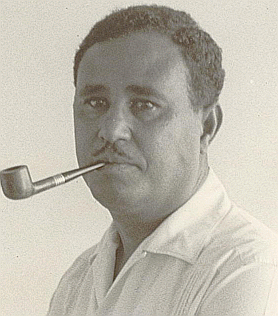
 PREMIER EDWARD OLIVER LEBLANC
(October 3, 1923 - October 29, 2004)
PREMIER EDWARD OLIVER LEBLANC
(October 3, 1923 - October 29, 2004)
Edward Oliver LeBlanc remains Dominicaís most successful and revered politician. He was born on October 3, 1923, one of twelve children of Anderson and Eunomie LeBlanc who lived in the hamlet of Rouillard, north of Vieille Case, Dominica. He attended the Vieille Case government school, where he excelled under the tutelage of school principal Clive Sorhaindo. He then attended the Agricultural School in Roseau and successfully completed the two year course. Thereafter, he was employed by government as an Agricultural Instructor at Portsmouth, La Plaine and Vieille Case. During this period he studied, through correspondence courses, for London Universityís Matriculation Exam (a precursor to the GCE), which he successfully completed in 1948. In the mid-1950s he was recruited by the Banana Growers Association as its Northern District representative, but he subsequently resigned to contest the 1957 general election. These were early demonstrations of the discipline and self-confidence which were to mould LeBlanc into the statesman he became.
It was his experience of the poverty in the villages and Dominicaís rigid class structure of the 1940s, which shaped LeBlancís social democratic views and his involvement in politics. In the late 1940s, he wrote articles to the Dominica Chronicle about the difficulties of life in Vieille Case; and in the early 1950s, he was elected to the Vieille Case Village Council. In 1957, he ran against R.B. Douglas for the Northern District representative in the national elections and scored a tremendous victory. Later that year, LeBlanc scored another victory when he was elected one of Dominicaís representatives to the West Indies Federation. He resigned his Federal post in 1960 to lead the Dominica Labour Party to victory in the January 1961 general elections.
In the following decade, during which he served first as Chief Minister then as Premier, LeBlanc vigorously sought to break down the social, political and economic barriers that had hobbled Dominicaís development. He fostered self government by empowering village councils; established a National Provident Fund, the precursor to the social security system; and built an expansive system of feeder roads to assist banana farmers. He increased the number of scholarships available to working class Dominicans, and expanded employment opportunities for all citizens. He imposed and enforced strict limits on foreign ownership of land, fostered greater appreciation for indigenous song, dance and storytelling, and did away with the Eurocentric celebration of Discovery Day on November 3, transforming it into a celebration of indigenous culture.
While the people saw LeBlanc as sincere, selfless and compassionate, his policies did not go unchallenged. By the late 1960s, he faced internal dissension within the Party and strong opposition from vested interests in Roseau. In 1970, he dismissed three of his ministers, who in turn dismissed him from the Dominica Labour Party. Thereafter, LeBlanc formed the LeBlanc Labour Party which defeated the Dominica Labour Party and the Dominica Freedom Party in the 1970 general election, winning eight of eleven constituencies. Four years later, when the island was besieged by social and political unrest, Edward LeBlanc took the unprecedented step of voluntarily resigning from office before the expiration of his five-year mandate, exasperated by the turmoil and duplicity of politics, and concluding also that the time had come for leadership change.
LeBlancís legacy as a political visionary persists despite the fact that, to a significant degree, he was an enigma. Bold and resolute, with a flair for political brinkmanship, he was also a private and sensitive individual who reveled in reading and writing poetry. He was disdainful of white colonial officials yet counted many whites among his associates. He was distrustful of the gwo boug (big shots) in Roseau, yet interacted well with members of that social group. A social democrat who eschewed the trappings of power, he nevertheless enacted legislation, such as the 1968 Seditious Act, which sought to stifle dissent in Dominica.
Premier LeBlancís enduring legacy was his dilution of the social, cultural and economic barriers which had hitherto impeded the progress of the working-class. He manifested a complete aversion to material wealth, and exited political office with little or none of the trappings of success. And for the many years he lead Dominica, no scandal was associated with him or his administrations. He was married to Ethel Patrick of Coton, a hamlet outside Vieille Case. They had five children - Ewart, Erin, Einstar, Earlsworth and Eustace. He died on October 29, 2004.
For his astute political leadership, his unwavering championing of the working class, and his abiding integrity and humility, DAAS honors Premier Edward Oliver LeBlanc.
Contributed by
Irving Andre
September 2008
See also;
Irving W. Andre. Edward Oliver LeBlanc and the Struggle to Transform Dominica. Pont Casse Press, Roseau, Dominica, 2004
LeBlanc, Edward Oliver in Honychurch: A-Z of Dominica Heritage